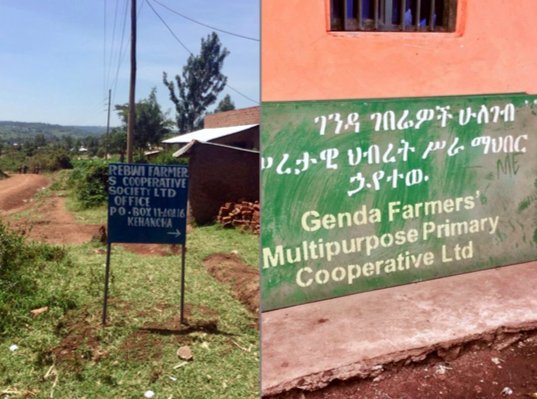This post is the fifth in a six-part series on Nuru’s rural livelihoods programming and how it helps farmers and their families take steps to move from surviving to thriving in their communities. The first post, second post, third post, and fourth post can be viewed by clicking the corresponding links.
Market-Based Development
One of the keys to developing and balancing the rural farmer capacities necessary for shock resilience is employing grounded and adaptive market-based approaches to development.
These approaches must simultaneously lay the foundation for specialization, professional record-keeping and market access, as well as ensuring that the livelihood diversification already in practice contributes to further food security. Nuru-supported farmer organizations are member-led agribusinesses with community interests represented by the very people that make up that community, like in Genda district of Ethiopia and Rebwi in Kenya. They engage with their neighbors during meetings and very literally define responsible business practice everyday. The farmer organizations communicate with the communities down the road on crop prices, input quality and cost, and they augment and increase the social cohesion necessary for the growth of a fair and safe rural economy that puts the highest practical value on the land and its people.
How Nuru Helps Rural Farmers
Nuru works closely with the farmer organizations for a period of years, providing capacity development training to leaders, boards of directors, and champion members to lay a sustainable foundation for continued prosperity without the need for Nuru services. Unfortunately, even the greatest efforts of farmers and their organizations cannot prevent the crash of commodity markets and prices, or stop a drought, alone. Nuru approaches value chains with a renewed focus on what technologies, assets, and investments can limit post-harvest loss, over-specialization, and ensure rural households have diversified their commercialized production to offset market collapse.
Moreover, Nuru acts as a mediator for farmer organizations every step along the value chain to encourage entrepreneurial actions, but also to protect against exploitive interests. Most importantly, this effort to build value chains from the ground up requires motivated partners at all scales, but a diverse set of partners, locally, are a necessity. Partners like local branch officers from Kenya Commercial Bank (KCB), Ethiopian cooperative development agents, and Seed Co Kenya input experts that are working with Nuru to deliver the services that are useful to farmers. Through pragmatic partnerships, rural prosperity and meaningful choices for rural families can be realized through co-created local value chains.
Nuru will further discuss this topic through our experiences in an upcoming blog series on USAID’s Marketlinks.


